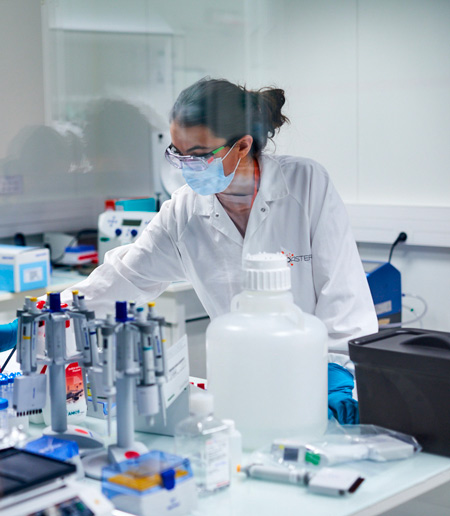Biomarkers
In the field of biomarkers, our added value lays on:
- Integration of biomarker expertise from discovery to development phases
- Collaboration with clinicians and key-opinion leaders in relevant therapeutic areas
- Extensive portfolio of biomarker assays, validated for research and development
- On purpose technological development of assays and data analysis
Biomarkers play an important role in the development of personalized medicine. Single biomarker or combination of markers, defined as signatures, can be host- or pathogen-related.
They can be used in disease diagnosis, as prognostic indicators, for developing individualized therapeutics, for predicting and treating adverse drug reactions or for pharmacodynamic and dose-response studies.
To meet your biomarker need as research or translational tool, or for companion/diagnostic tests, we propose a multistep and iterative approach that combines well-controlled biomarker selection process with fit-to-purpose analytical technology that helps building a strong biomarker testing strategy across all phases of development mitigating risks at key stages of your program.
Discovery and validation of biomarkers request a strong multidisciplinary synergy between our scientists, clinician partners, and our data analysts to ensure scientific excellence and a benefit to your study. Furthermore, we pay particular attention to designing a relevant study by understanding your needs and defining the expected target profile according to the desired application.
A three-stage process is setup according to the targeted (hypothesis-based) or non-targeted (discovery-based) approach defined with you at the onset of the program.
Biomarker discovery
Aim: identify candidate biomarkers using
OMICS technology
Biomarker validation
& analytical technology development
Aim: confirm candidate biomarkers in an independent study with an adapted analytical device
Biomarker clinical relevance confirmation
Aim: demonstrate the clinical relevance of biomarkers in larger cohort with the most advanced (or IVD-graded) bioanalytical device
Biomarker discovery
The objective of this phase is to identify candidate biomarkers whose expression correlates with the mode of action of a drug, a pathophysiological change in a disease, the presence of a pathogen, the evolution of a therapy or the follow-up of a safety or efficacy study of a treatment.
Our experts will help you to design your study in a customized way and to define the most appropriate analytical technology by taking into account several factors like i) the nature of the biomarker (molecular, protein, metabolites, lipids,..), ii) the type and the origin of specimens (human vs animal; tissue, organs, biofluids) that will impact sample preparation method, iii) the target application (drug development, companion or diagnostics) and iv) the final users (laboratory vs point-of-care tests).
We provide a large portfolio of advanced “OMICS” technologies with reliable protocols from the sample preparation initial step until complex & multi-source dataset bioinformatics/biostatistics analysis in the field of genomics, transcriptomics, proteomics and metabolomics. We explore systems biology that can improve current biomarker discovery strategies by extracting new biological information. It exploits complex, multi-gene systems by integrating a computational approach to genetic data as well as molecular signaling pathways.
Learn more about our OMICS & Xdata technologies.

Biomarker validation & analytical technology development
Biomarkers identified with targeted (based on pre-existing hypotheses) or non-targeted (based on discovery without preconceptions) approach require rigorous validation.
We help you in this challenging phase to allow an effective exploitation of a biomarker in a clinical application. This step is based primarly on confirming the candidate markers in an independent study using human specimens or in animal models, and the implementation of validated bioanalytical platforms suited to the study. According to the nature and number of markers studied, single/multiplex qPCR, flow cytometry or multiplexed immunoassay platforms can be used. Biostatistical methods are applied to reduce the set of genes of interest and define the final signature with the highest diagnostic performance.
Microsystem-based devices can be a technology of choice to validate presence and relevance of a biomarker. As an example, we apply droplet-based single-cell analysis of cellular phenotype that provide sensitivity and resolution for biomarker validation unattainable by current bulk methods. Single-cell resolution can reveal treatment resistance mechanisms or abnormal immune response allowing to stratify patients in clinical trials.

Biomarker clinical relevance confirmation
Therapeutically, we help you demonstrate the relevance of surrogate endpoint biomarkers in pre-clinical or early clinical phase studies to minimize the number of patients, as well as the time and resources, required for pivotal studies.
From a diagnostic standpoint, we support you to demonstrate the clinical relevance and usefulness of the markers either as companion diagnostics or in diagnosic tests. Validated biomarkers will be measured in a larger cohort with the most advanced (or IVD-graded) bioanalytical device that can be a molecular platform (e.g. NGS, simplex or multiplex qPCR assays), an automated immunoassay platform in laboratory or a rapid diagnostic test at the patient bedside.
To reach this goal, we partner with a clinical network (hospitals, clinics) for access to well-characterized human biospecimens associated to high quality clinical and microbiology data from retrospective or prospective studies. Our contribution to the conduct of observational and longitudinal clinical studies includes the drafting of case reports, informed consent forms, protocols and regulatory submissions for good Good Clinical Practice under the ISO9001 Standard Certification.
Read more about Clinical Operations technology.
Biomarker validation & analytical technology development
Biomarkers identified with targeted (based on pre-existing hypotheses) or non-targeted (based on discovery without preconceptions) approach require rigorous validation.
We help you in this challenging phase to allow an effective exploitation of a biomarker in a clinical application. This step is based primarly on confirming the candidate markers in an independent study using human specimens or in animal models, and the implementation of validated bioanalytical platforms suited to the study. According to the nature and number of markers studied, single/multiplex qPCR, flow cytometry or multiplexed immunoassay platforms can be used. Biostatistical methods are applied to reduce the set of genes of interest and define the final signature with the highest diagnostic performance.
Microsystem-based devices can be a technology of choice to validate presence and relevance of a biomarker. As an example, we apply droplet-based single-cell analysis of cellular phenotype that provide sensitivity and resolution for biomarker validation unattainable by current bulk methods. Single-cell resolution can reveal treatment resistance mechanisms or abnormal immune response allowing to stratify patients in clinical trials.

Usefulness of biomarkers in diagnostics, companion diagnostics and for support of vaccine & drug development/translational research:
| Diagnostic | Companion Diagnostics | Support of Vaccine/ Drug Development & Translational Research |
|
|---|---|---|---|
| Biomarker utility | Diagnosis, prognosis, treatment monitoring of a disease. Highly recommended for safe prescription and good medical practice. |
Selection of the right patients. Associated to a targeted therapy (Personalized Medicine). Predictive to treatment outcome. |
Vaccine/drug mode of action. Characterization of physiopathology. Translational tools. Safety/efficacy assessment. |
| Technology required for development | OMICS-based or biomarker-specific detection platforms. | Specific detection platforms. | OMICS-based or specific detection platforms. |
| Type of technology for final biomarker analysis | Point of care, laboratory testing. | Point of care, laboratory testing. | Laboratory testing. |
| Regulatory basis | IVDR registration. | Drug-diagnostics co-registration. | Not applicable. |
